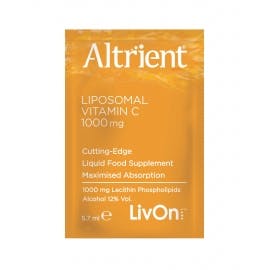How to hang on to vitamin C and reap the benefits
According to scientific evidence, vitamin C is an essential nutrient that we simply cannot do without, especially as it’s not produced by the human body and must be sought from the diet.
The difficulty with vitamin C is in maintaining optimal levels to ensure your overall wellbeing, which becomes progressively harder with age and ill health. Compared to younger people, the elderly, as well as smokers and individuals suffering from diabetes and high blood pressure, have lowered levels of vitamin C.
What’s more the vitamin C content of food is decreased by prolonged storage and some cooking methods, so even if you are getting plenty of fruit and vegetables, you may still be losing out.
Common sense would suggest that vitamin C supplementation could offer valuable nutritional support, but taking vitamin C alone does not necessarily guarantee increased blood plasma levels. You need a form of delivery that is easy to take, long lasting and readily available for your body to absorb and utilise effectively.
This is where many standard oral supplements fall short. As an example, traditional time-release vitamin C tablets are often:
- Large and difficult to swallow
- Slow acting
- Poorly absorbed 8
- Unpalatable
- Expensive
By contrast an oral Vitamin C powder can offer numerous advantages:
- Fast acting, enhanced absorbability
- Ideal for children and the elderly, can be added to liquid or sprinkled on foods
- Easy to adjust dosage without the need to swallow several large pills
- More convenient, portable and doesn’t need refrigeration
- Doesn’t contain unnatural fillers normally used to bind ingredients in tablets together
- More cost effective than other forms of vitamin C
Why the type of Vitamin C makes a difference
Vitamin C or ascorbic acid is a water-soluble vitamin, which means it can only reach watery environments in the body. It is also subject to tightly regulated absorption mechanisms that limit how much can be taken up by the gut at any one time.
However, there are ways to ensure your body gets the most out of the Vitamin C you do take.
Teaming vitamin C with other types of ascorbic acid and additional complimentary nutrients such as ascorbyl palmitate, sodium ascorbate magnesium ascorbate, Bioperine, D-ribose and dihydroquercitin may help to improve its absorption in both fat and water soluble environments and enhance its overall wellbeing effects.
Why Vitamin C remains a firm favourite
Vitamin C is a remedy for all seasons, which is why there is barely a bathroom cabinet in the country that doesn’t house a pot or two.
In the Spring when seasonal allergies are at their worst Vitamin C may provide a helping hand because it contributes to the normal function of the immune system.
Around this time, asthma and other respiratory conditions often flare up triggering sneezing, a stuffy nose and red itchy eyes. This allergic response is due to histamine, a substance released by the immune system in response to the allergens.
Allergic reactions generally occur when the immune system overreacts to a harmless substance such as pollen.
Maintaining a healthy immune system may help to normalise your body’s reactions to allergens. The addition of vitamin C may also provide nutritional support when experiencing some of the unpleasant symptoms.
During the Summer Vitamin C comes into its own as an important antioxidant that may support the health of your skin. Antioxidants are naturally occurring compounds that help to neutralise free radicals, which may occur as a result of chronic overexposure to the sun.
Because vitamin C contributes to the protection of cells from oxidative stress it can provide useful nutritional support at a time when your skin needs as much support as it can get.
In the gloomy months of Autumn when the days are getting shorter and darker you need to keep your diet healthy and gather together as many coping mechanisms as possible to help prevent the onset of SAD (seasonal affective disorder).
As part of a healthy balanced diet vitamin C is particularly important because it contributes to normal psychological function.
It’s not hard to see why Vitamin C might be beneficial. It’s found in high concentrations in the brain and is thought to be an important cofactor for the synthesis of norepinephrine and dopamine, neurotransmitters that are involved in mood regulation.
One study from McGill University in Montreal investigating the moods of hospital patients, reported favourable results after administering 500mg of vitamin C twice a day to participants in the trial. 13
Throughout winter you can always enlist the help of Vitamin C whilst avoiding people already struck down with colds and flu. Vitamin C contributes to the normal function of the immune system and may provide just the kind of additional support that you need at this time of year.
Vitamin C performs many tasks in the body and these are just a few of the many reasons why it’s worth investing in a daily dose. If you’re worried you might not be getting your daily quota, keeping a few sachets of powdered vitamin C in your pocket might put your mind at rest.
Jacqueline Newson BSc (Hons) Nutritional Therapy
References
- Burr, M.L., Elwood, P.C., Hole, D.J., Hurley, R.J., Hughes, R.E., Plasma and leucocyte ascorbic acid levels in the elderly. Am. J.Clin. Nutr., 1974, 27, 144- 51.
- Carr AC, Maggini S. Vitamin C and Immune Function. Nutrients. 2017;9(11):1211.
- Calero CI et al. Allosteric Modulation of Retinal GABA Receptors by Ascorbic Acid. J Neurosci. 2011 Jun 29;31(26):9672-82.
- Harper KA, Morton AD, Rolfe EJ. Phenolic compounds of black currant juice and their effect on ascorbic acid. III Mechanism of ascorbic acid oxidation and its inhibition by flavonoids. J Food Tech. 1969;4:255-67.
- Harrison FE and May JM. Vitamin C Function in the Brain: Vital Role of the AscorbateTransporter (SVCT2) Free Radic Biol Med. 2009 March 15; 46(6): 719–730.
- https://www.sciencedirect.com/topics/pharmacology-toxicology-and-pharmaceutical-science/taxifolin. [Accessed 8.4.19]
- https://examine.com/supplements/black-pepper/. [Accessed 8.4.19]
- Mayersohn M, Robinson JB, Yung S. Ascorbic Acid Absorption in Humans: A Comparison among Several Dosage Forms. Journal of pharmaceutical Sciences 1982; 71, 3: 282-285.
- Nijveldt RJ, van NE, van Hoorn DE, et al. Flavonoids: a review of probable mechanisms of action and potential applications. Am J Clin Nutr. 2001 Oct;74(4):418-25.
- Verma SK (2016). Developing New Functional Food and Nutraceutical Products, Edition: 1, Chapter: Nutraceutical Formulations and Challenges, 161-171. Academic Press: USA.
- Pelletier, O., Vitamin C status of smokers and non-smokers. Am. J.Clin. Nutr., 1970, 23, 520-4.
- Chalker E, Douglas CE & Hemila H. Vitamin C for preventing and treating the common cold. Cochrane Database of Systematic 2007; 3.
- Zhang M, et al. Vitamin C provision improves mood in acutely hospitalized patients, Nutrition (2010).




